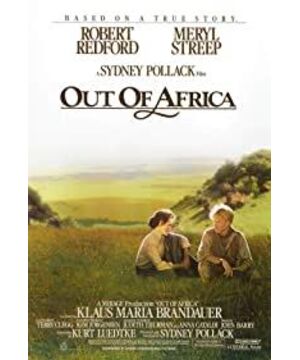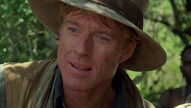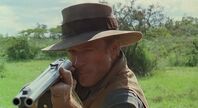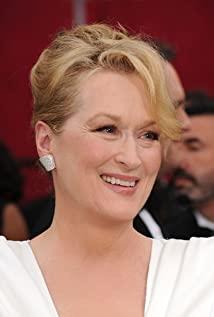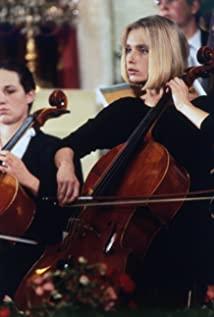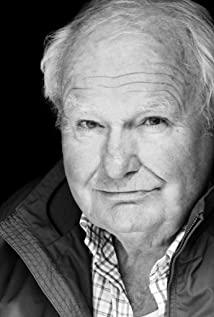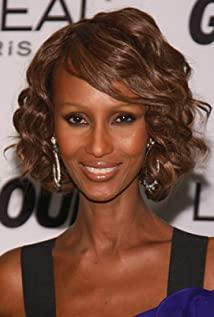To some extent, it seems to have reached a peak state. It gives me the feeling that it is such a state that cannot go beyond its limits.
Meryl is a great actress, she can have all kinds of memorable roles. Woolf in "All the time", she is a beautiful and gentle image of intelligence. And this year's "Lion in the Sheep's Mouth" directed by Redford and co-starred with Tom Cruise and Redford, the senior reporter she plays is still as beautiful and wise, and her image is more beautiful than "Out of Africa" more gentle. Redford, however, does seem to be getting old. He is seventy years old. The years engraved on his face are not vicissitudes, but a kind of tenderness and grace. And this kind of tenderness and grace, but it is so far from the original starring Dennis at the age of forty-seven. After all, time has passed.
The film "Out of Africa", first of all, tells the story of a woman's extraordinary tenacity and love.
The special narrative style of "Out of Africa" is closely related to its beautiful background music and Meryl's slightly squeaking voice and narrative rhythm. Speaking of this film, the first impression is the background music that emerges with the vast African wilderness, and the special dialogue with that Danish accent:
He even took the gramophone on safari. Three rifles, supplies for a month...and Mozart.
He even carried a gramophone on his hunting excursions. Three shotguns, a month's ration, and Mozart.
Karen's memories of Africa begin with Dennis in a dream. Later, the opening line of the original story arrived, "I have a farm in Africa, at the foot of Mount Ngong."
In Nairobi, on a plateau of four or five thousand meters above sea level, Karen has six thousand acres of land. Among them, 600 acres are planted with 4,000 plants of coffee. These coffee trees, on the plateau, require four years of hard work and storms to harvest. In spring, the white coffee flowers are slightly bitter. In autumn, when the coffee beans are harvested, the coffee beans are more fiery and warm.
Africa has a beautiful horizon, lush tropical forests, roaming lions in pairs, elephants, buffalo, deer and all kinds of wild animals.
There is a ballade titled "Song of Africa" in the film. Karen once said in her narration,
if I were familiar with an African song—
one singing gazelle and African crescent perched on its back,
one singing the work of the fields,
and the one of the coffee-picking farmer Zhang Zhang's sweaty face is a song,
so does Africa also know a song about me?
Did the morning dew in the African wilderness tremble with the color of my old clothes?
Could my first and last name be used in games invented by African children?
On the fifteenth round night in Africa, did the moon wheel ever project a figure of a woman similar to me into the rut of the cobblestone road?
Or, did the eagles of Mount Ngong often look for me everywhere?
This is the beauty of Africa, the most primitive, touching and instinctive experience and beauty. The beauty of Africa melts into Karen and Dennis's feelings, into their primitive and elegant, clean and mellow love. Therefore, it makes people memorable, unforgettable!
Karen came from as far away as snow-covered Denmark. This beautiful and strong woman has her African living room furnished as it is in Denmark and England, with beautifully comfortable sofas, rugs, warm fireplaces, lovely wall clocks, and even magnets and crystals from the middle of France.
At the plantation, she also allows the environment to have a pliable and beautiful texture because of her.
The cultivation of the coffee estate is hard and mellow, and the hunting is rich and precious. The local Kikuyu people, the Fala around him, and the stubborn and lovely young man in the kitchen are closely related to Karen.
Most importantly, Dennis. Born in Oxford, Dennis likes all natural and primitive scenery, including the African land and the animals and people there. Man-made things, about the phonograph, brought him Mozart; the plane, brought him a beautiful vision; liked Karen's story, let her write it down; liked Karen's ingenuity and actions, gave her a compass; he himself , except Karen, with books and music, with the loneliness of freedom...
At the end of the movie, Karen, who tried to embrace everything, lost all of it. The farm, family and friends, including the stubborn Dennis, finally succumbed to her tenacity to give up his freedom to be alone, but also made a deadly joke with Karen. Dennis' plane crashed, and he stayed on the hillside with good views, with the lionesses and lionesses who often gathered at his grave at sunrise and sunset. He alludes to secular marriage, which cannot give Karen secular commitments. He praised the Kikuyu for being as natural and pure as the African animals: look, they were never insincere. Just like two lions, now they have a feeling, lie down, and they are together, very natural.
As a result, the love and waiting for the bus that he and Karen used to get along with each other will always stay on that high ground. Later, the lion king and lion mother inherited the love they once had and left them with lasting memory.
Karen saw Dennis for the last time before she lost the farm and was about to return home. She told her resentment and longing:
Maybe you're right, the farm was never mine.
One thing I learned slowly,
when things got too bad, I thought, it can't get any worse.
In my heart I tried to make it worse.
I remembered over and over our camping by the river, the dead Barclays,
the first time you flew me, and
it was all so beautiful.
When I feel like I can't take it anymore,
I can still hold on for that moment...
then hold on for that moment, and then I start to know that I can take it all.
Karen lost everything: no farm, no coffee plantation, no estate.
Dennis was gone, Farah was gone, the house and the estate were sold off.
Later, using the pen that Dennis gave her, she began to tell in a narrative style that Dennis liked, about Africa that did not belong to her, the manor and farm that did not belong to her, and the friends of Dennis and Kenya that did not belong to her.
In 1934, Karen published her first story, Out of Africa, and she never went back.
View more about Out of Africa reviews


